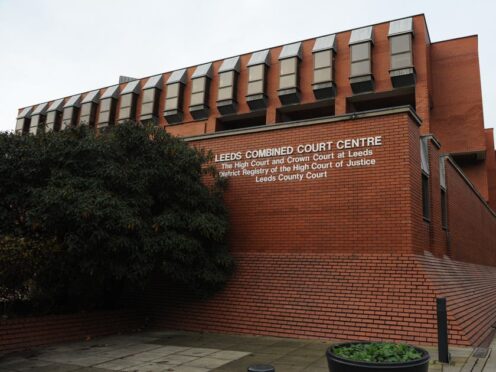
A woman who ran a multimillion-pound touting business which bought and sold tickets on an “industrial scale” has been jailed for four years by judge who said she acted “out of greed”.
Maria Chenery-Woods, who was known as the Ticket Queen, was the driving force behind Norfolk-based TQ Tickets Ltd, which used dozens of identities to buy tickets for high-profile acts such as Ed Sheeran and Lady Gaga and sell them on secondary ticket websites, often at highly inflated prices, a judge said.
The 54-year-old was jailed at Leeds Crown Court on Friday alongside her employee Paul Douglas, who was given a prison sentence of two years and five months.
Chenery-Woods’s husband Mark Woods and her sister Lynda Chenery, who is also Douglas’s ex-wife, were given suspended prison sentences by Judge Simon Batiste.
Chenery-Woods and Douglas admitted fraudulent trading but Woods and Chenery were convicted by a jury earlier this year which heard how TQ Tickets sold ticket worth more than £6.5 million between 2015 and 2017.
But Judge Batiste said this figure only covered part of the period the company was trading and did not include hundreds of thousands of pounds worth of unsold tickets trading standards officers found when they raided its offices in the Norfolk village of Dickleburgh.
Judge Batiste said: “What was being done was purely to maximise profit and out of greed.”
He said: “Your aim was to rinse or fleece customers out of as much money as you could.”
The judge explained how TQ Tickets used a file of more than 100 identities to buy tickets from primary selling sites like Ticketmaster.
These identities included a 10-year-old child, a dead relative and some who were completely fake.
Judge Batiste explained how the firm “created a web of criminality” as they also “corrupted” students and other young people into buying tickets for them.
The firm would then resell the tickets – often at vastly inflated prices – on secondary ticketing platforms such as Viagogo.
Judge Batiste said on Friday: “Some secondary ticketing sites and, indeed, possibly some primary sites, were complicit in what you were doing. But that provides no mitigation.”
During the trial, the jury heard statements from Mr Sheeran’s manager Stuart Camp and promoter Stuart Galbraith, who described the “extensive measures” they went to as they tried to prevent the re-selling of tickets at inflated prices for the singer’s 2018 UK stadium tour.
Following the verdicts, Mr Galbraith said: “Today’s verdict is good news for live music fans, who are too often ripped off and exploited by greedy ticket touts.”
The case of those involved with TQ Tickets follows an almost identical prosecution by National Trading Standards of a married couple who ran the London-based firm BZZ.
BZZ’s Peter Hunter and David Smith were jailed for four years and two and a half years respectively in February 2020, following a landmark trial, and they were subsequently ordered to pay back more than £6.2 million by the court.

On Friday, Judge Batiste said the TQ Tickets case was “if anything, more serious” than the BZZ offending.
The judge said the actions of TQ Tickets, which included speculatively listing tickets for sale before they had even sourced them, sometimes led to fans being refused entry to venues or with poorer tickets than they paid for.
The jury heard that in the period June 2015 to December 2017, the firm had sales in excess of £6.5 million on secondary ticket platforms.
The firm bought 47,000 tickets during that period, using 127 names and 187 different email addresses.
In one message shown to the jury, Douglas said to Chenery-Woods that the purpose of the business is to “simply rinse consumers for as much profit as they are willing to pay”.
The judge said Douglas was Chenery-Woods’s “lieutenant” and told him that he “revelled in the amount you could rinse unsuspecting customers for”.
He said Douglas bought and sold tickets “on an industrial scale”.
Chenery-Woods, of Dickleburgh, near Diss, Norfolk, and Douglas, 57, of Pulham Market, Norfolk, admitted three counts of fraudulent trading earlier this year.
Chenery, 52, and Woods, 60, both of Dickleburgh, were found guilty of the same charges.
Woods was given a two-year prison sentence, suspended for two years. He was also ordered to do 250 hours of unpaid work and told he must observe an electronically monitored curfew between 8pm and 6am for four months.
Chenery, who sobbed uncontrollably as she was sentenced, was given a 21-month jail sentence, suspended for two years. She was also ordered to do 180 hours of unpaid work with a 20 day rehabilitation activity requirement.
The defendants will now face a confiscation hearing on December 2.
Lord Michael Bichard, chairman of National Trading Standards, said: “Having spent hard earned money on tickets for highly anticipated live events, too many people discover too late that they’ve been the victim of a scam, turning excitement into distress.
“Today’s sentencing marks another significant milestone in our work to combat online ticket touts, which has already resulted in landmark prosecutions, and sends a clear message that criminals trying to rip off honest fans risk prosecution.”

Enjoy the convenience of having The Sunday Post delivered as a digital ePaper straight to your smartphone, tablet or computer.
Subscribe for only £5.49 a month and enjoy all the benefits of the printed paper as a digital replica.
Subscribe